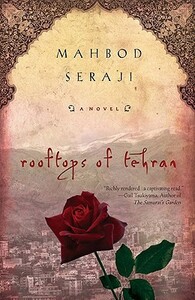You need to sign in or sign up before continuing.
Take a photo of a barcode or cover
I love history and love how the authors enrich the story in a fictional story. We get to follow the main character Pasha's journey in Iran. This was Iran before the Iranian revolution took place, in 1978-1979. Although the story is fictional, you as a reader can read about what it was like in Iran in the past. How the great powers in Iran governed the various ethnic groups and how many, especially young people, demonstrated for their rights. We also get to read how the love for their friends, families but also their loved ones was the basis for survival. An incredibly fine book with a very rich history of Iran.
I really enjoyed reading this book. I wish I could have gotten the perspective on the events and way of life from the females characters as well though.
I quite enjoyed this book. I had never heard of this book before going into it but was interested because I love Persepolis and was interested in reading more books about Iran during their revolution.
I really liked the perspective of the main character and seeing the life of an average Iranian boy. I thought it gave a great insight as to how the revolution took hold.
I like the flash forwards a lot and thought they were very intriguing making me want to read more to find out how we got there. This book could have gotten a lot more dark and depressing than it did but that little peek into the darkside of the pre-revolution Shah Iran.
I also really liked the side characters in this book and learning about the neighbourhood and world of the main characters. I would have liked having a bit of a larger view of Tehran as a whole, but it was kind of nice reading about this more insular world. It was also interesting learning a little bit about Iranian culture.
My one major complaint of this book was that I thought it ended too soon. I wish there had been more of a resolution or that we got to see the Iranian revolution through to its end because I felt that it ended in the middle of a major event in history.
That being said, I did enjoy the glimpse into pre-revolution Iran that we did see and the start of this movement. I would recommend this book
I really liked the perspective of the main character and seeing the life of an average Iranian boy. I thought it gave a great insight as to how the revolution took hold.
I like the flash forwards a lot and thought they were very intriguing making me want to read more to find out how we got there. This book could have gotten a lot more dark and depressing than it did but that little peek into the darkside of the pre-revolution Shah Iran.
I also really liked the side characters in this book and learning about the neighbourhood and world of the main characters. I would have liked having a bit of a larger view of Tehran as a whole, but it was kind of nice reading about this more insular world. It was also interesting learning a little bit about Iranian culture.
My one major complaint of this book was that I thought it ended too soon. I wish there had been more of a resolution or that we got to see the Iranian revolution through to its end because I felt that it ended in the middle of a major event in history.
That being said, I did enjoy the glimpse into pre-revolution Iran that we did see and the start of this movement. I would recommend this book
♥♥♥♥♥
So begins the tale of Pasha, who is for reasons yet unknown to the reader, sitting in a wheelchair in a psychiatric hospital in Tehran, Iran. After reading the first page, I immediately purchased the ebook. It was the most addictive experience I had in a very long time.
This novel is a random series of beautifully composed vignettes, loosely tied together by a string of characters and words.
Or in my own words: beautiful, painful, frustrating, soothing, heartbreaking, and hopeful. Just as life is.
The story sets around Pasha and his friends Ahmed, Faheemeh, Doctor, Zari, Iraj, and the neighbourhood they live in. Skipping between summer 1973 and winter 1974, events are gradually leading up to each other. There is something about the way Seraji writes, that enables you to feel every word and makes you really get to know the characters. And they're worth it; they all have That.
Dear mr. Seraji, I want to applaud you for not only writing a superb novel, but also providing the reader a peek into rich culture and beautiful people of Iran. At the end of the novel, you've added a personal note to the reader, in which you say:
"Perhaps as you read the novel— as you meet Pasha’s friends Ahmed, Faheemeh, Doctor, Iraj and Zari; as you accompany Pasha down the alleys of his neighborhood; as you spend a night on his roof, peek into his neighbor’s window, and fall in love with the girl next door— you’ll understand my affection for Iran and its people. And you will see why the flame of hope for Iran still burns so fiercely in my heart, and in the hearts of so many Iranians at home and abroad."
I want you to know that I do see, and I do understand. Thank you.
"If I had a book, I would read it.
If I had a song, I would sing it.
If I knew a dance, I would dance it.
If I knew a rhyme, I would chant it.
If I had a life, I would risk it.
If I could be free, I would chance it."
So begins the tale of Pasha, who is for reasons yet unknown to the reader, sitting in a wheelchair in a psychiatric hospital in Tehran, Iran. After reading the first page, I immediately purchased the ebook. It was the most addictive experience I had in a very long time.
This novel is a random series of beautifully composed vignettes, loosely tied together by a string of characters and words.
Or in my own words: beautiful, painful, frustrating, soothing, heartbreaking, and hopeful. Just as life is.
The story sets around Pasha and his friends Ahmed, Faheemeh, Doctor, Zari, Iraj, and the neighbourhood they live in. Skipping between summer 1973 and winter 1974, events are gradually leading up to each other. There is something about the way Seraji writes, that enables you to feel every word and makes you really get to know the characters. And they're worth it; they all have That.
Dear mr. Seraji, I want to applaud you for not only writing a superb novel, but also providing the reader a peek into rich culture and beautiful people of Iran. At the end of the novel, you've added a personal note to the reader, in which you say:
"Perhaps as you read the novel— as you meet Pasha’s friends Ahmed, Faheemeh, Doctor, Iraj and Zari; as you accompany Pasha down the alleys of his neighborhood; as you spend a night on his roof, peek into his neighbor’s window, and fall in love with the girl next door— you’ll understand my affection for Iran and its people. And you will see why the flame of hope for Iran still burns so fiercely in my heart, and in the hearts of so many Iranians at home and abroad."
I want you to know that I do see, and I do understand. Thank you.
I honestly didn't expect to really like this book. I picked it up at the Green Valley Book Fair for a couple bucks as something different, outside my normal reading choices. Instead, it was a very compelling, personalized look at Iran in the 70s leading up to the revolution.
I was struck by how much stock everyone put in sending the high school graduate to America to study. Even though all his papers were faked, he spoke no English, and had no where to live, this was regarded a a surefire plan for life success.
My one real complaint is the female characters. They seemed either idealized (the young ones) or stereotyped (the older ones). The idealized heroine and a predictable ending unfortunately kept the book from being really great.
I was struck by how much stock everyone put in sending the high school graduate to America to study. Even though all his papers were faked, he spoke no English, and had no where to live, this was regarded a a surefire plan for life success.
My one real complaint is the female characters. They seemed either idealized (the young ones) or stereotyped (the older ones). The idealized heroine and a predictable ending unfortunately kept the book from being really great.
Rooftops of Tehran was an absolutely beautiful book with a phenomenal protagonist, a heartbreaking story, and an exploration of our choice between doing what is allowed and what is right.
One of the first things I noticed about this wonderful book was the format. Formatted with alternating chapters between the present and the past, a wonderful apprehension is created. From the very beginning you notice this beautiful tension. There is a disconnect between the two times, a gulf of time and distance that holds treacherous dangers and mysteries. As the book continues towards this crashing of two realities the suspense is expertly crafted as we wait on the edges of our chairs.
full review: https://utopia-state-of-mind.com/review-rooftops-tehran-mahbod-seraji/
One of the first things I noticed about this wonderful book was the format. Formatted with alternating chapters between the present and the past, a wonderful apprehension is created. From the very beginning you notice this beautiful tension. There is a disconnect between the two times, a gulf of time and distance that holds treacherous dangers and mysteries. As the book continues towards this crashing of two realities the suspense is expertly crafted as we wait on the edges of our chairs.
full review: https://utopia-state-of-mind.com/review-rooftops-tehran-mahbod-seraji/
I couldn't decide at first if this book was YA or adult, but I ended up classifying it as adult since the imprint the book was published under isn't YA. Plus Pasha seemed more like a vehicle for the author to use in order to express his views. Pasha seemed more mature than the average seventeen-year old guy, but maybe American male teenagers are just less mature than male teenagers in other countries? Obviously there are exceptions to that rule but I had a hard time believing Pasha was a teenager in high school. Especially when he's using extremely eloquent, flowery language such as "life was a random series of beautifully composed vignettes, loosely tied together by a string of characters and time." (pg. 4) I didn't like the Doctor storyline. I admire Doctor but I never got the feeling that Zari really loved him thus her devastating choice was harder to understand. The ending was satisfactory, there are some loose ends but such is life and there is supposedly a sequel being written which I would definitely read. Zari's choice is probably one of the best climaxes in a book I've ever read, it was unexpected and horrific. I honestly don't think any Westerner unfamiliar with the Middle East could see it coming. The book opens with Pasha in a mental hospital in 1974 and I flew through the book in an effort to discover why he was there.
This book provides a through view of life In one middle-class neighborhood in Tehran. Pasha is a voracious reader and it's both amusing and bemusing to read some of things he and his friends think about the U.S. His observations allow readers to compare the daily life of Iranians to daily life here, and things we take for granted, not just with amenities and freedoms but things like falling in love. "I read somewhere that people in the West, like in the U.S. and Europe, date for a long time before falling in love,' I say, restless with anxiety. [...]'But here in Iran, we look at someone, and we fall in love. All the girl has to do is smile, and we're swept off our feet. No dating, no getting to know each other, no real opportunity to get acquainted, do you know what I mean?'" (pgs.56-57) More than anything, the point is really reinforced that Iranians will bitter for quite some time at the U.S. for being STUPID enough to reinstate the Shah. Personally, I think it's one of our worst foreign policy blunders. In addition to the cultural tidbits, the book has the BEST best friend I've ever come across. I want an Ahmed in my life. He's gallant, rebellious tender and absolutely hilarious. I offer you a teaser "You're a good dancer', Faheemeh compliments him. [Ahmed]
'I had dance lessons from Tennessee Williams himself.'
'Tennessee Williams was not a dancer,' I [Pasha] argue.
'I tried to tell Tennessee that, but he wouldn't hear of it.'" Ahmed (pg. 67) I giggled at that line and any other time Ahmed opened his mouth. He's the type of friend that tries to make Pasha laugh through his tears and he avoids uncomfortable topics because he knows that he's basically the glue that keeps everyone together. If Ahmed cried, they would all be done. And there's lots of tears, Iranians mourn for a long time and in an elaborate, open, manner. They wail, tear at their clothes, etc. The author brings this vividly to life along with other elements of Iranian culture but at the heart of this novel is the painful, but oh-so-worth-it aspect of first love. I would recommend this to those who've fallen in love, are transfixed by the Middle East/Iran or just looking for a historical fiction romantic tragedy. But honestly, I'd recommend it to everyone, especially since we need to recognize and respect those who have That.
This book provides a through view of life In one middle-class neighborhood in Tehran. Pasha is a voracious reader and it's both amusing and bemusing to read some of things he and his friends think about the U.S. His observations allow readers to compare the daily life of Iranians to daily life here, and things we take for granted, not just with amenities and freedoms but things like falling in love. "I read somewhere that people in the West, like in the U.S. and Europe, date for a long time before falling in love,' I say, restless with anxiety. [...]'But here in Iran, we look at someone, and we fall in love. All the girl has to do is smile, and we're swept off our feet. No dating, no getting to know each other, no real opportunity to get acquainted, do you know what I mean?'" (pgs.56-57) More than anything, the point is really reinforced that Iranians will bitter for quite some time at the U.S. for being STUPID enough to reinstate the Shah. Personally, I think it's one of our worst foreign policy blunders. In addition to the cultural tidbits, the book has the BEST best friend I've ever come across. I want an Ahmed in my life. He's gallant, rebellious tender and absolutely hilarious. I offer you a teaser "You're a good dancer', Faheemeh compliments him. [Ahmed]
'I had dance lessons from Tennessee Williams himself.'
'Tennessee Williams was not a dancer,' I [Pasha] argue.
'I tried to tell Tennessee that, but he wouldn't hear of it.'" Ahmed (pg. 67) I giggled at that line and any other time Ahmed opened his mouth. He's the type of friend that tries to make Pasha laugh through his tears and he avoids uncomfortable topics because he knows that he's basically the glue that keeps everyone together. If Ahmed cried, they would all be done. And there's lots of tears, Iranians mourn for a long time and in an elaborate, open, manner. They wail, tear at their clothes, etc. The author brings this vividly to life along with other elements of Iranian culture but at the heart of this novel is the painful, but oh-so-worth-it aspect of first love. I would recommend this to those who've fallen in love, are transfixed by the Middle East/Iran or just looking for a historical fiction romantic tragedy. But honestly, I'd recommend it to everyone, especially since we need to recognize and respect those who have That.
really loved the book, the story was incredible and the characters were very compelling. Sadly I read it as an audiobook and the narrator wasn't the best fit for the story, definitely read the paper or ebook version!!
I enjoyed this story and the parallel unfolding of revolutionary activities and forbidden romance. Most of it was excellent, but sometimes the writing didn't fully capture me. The ending was also a bit predictable, although in the first half I liked the bits of Pasha's time in the mental hospital interwoven with the plot.




